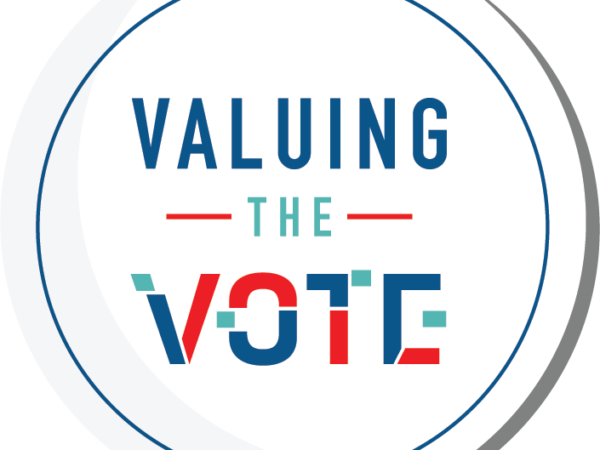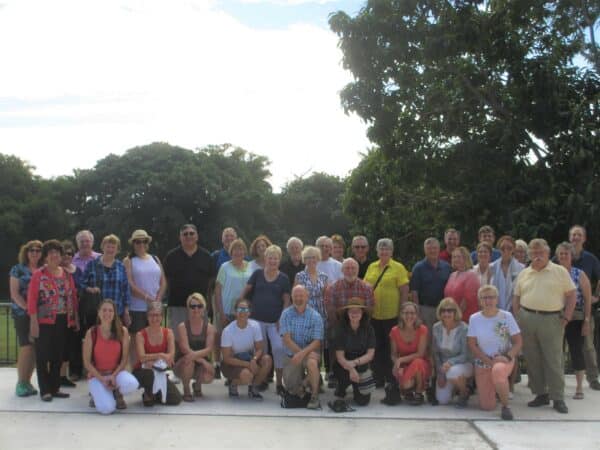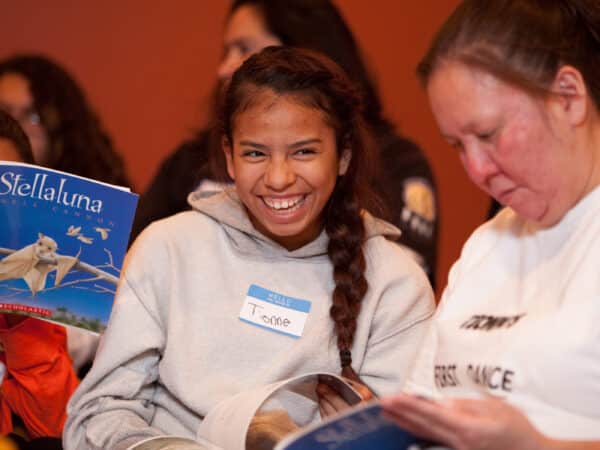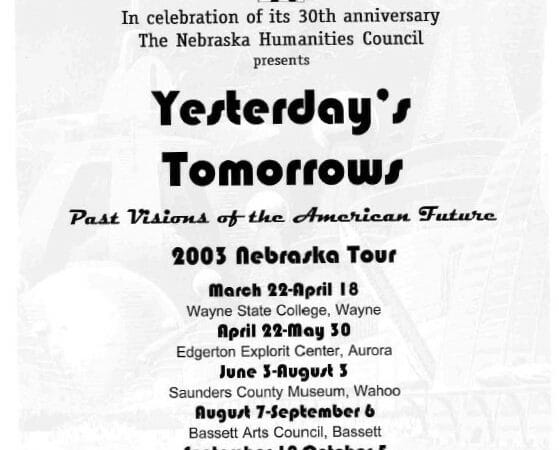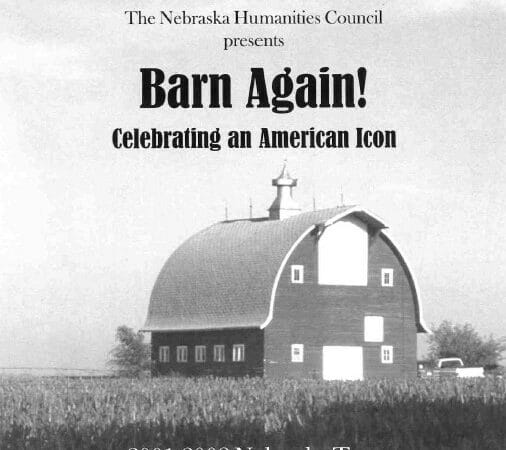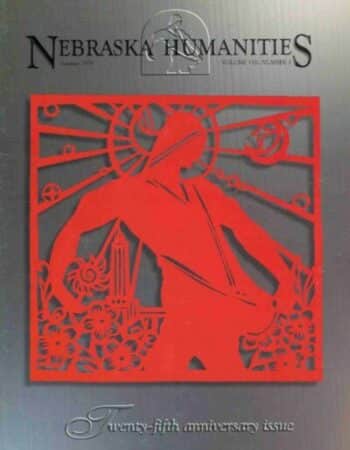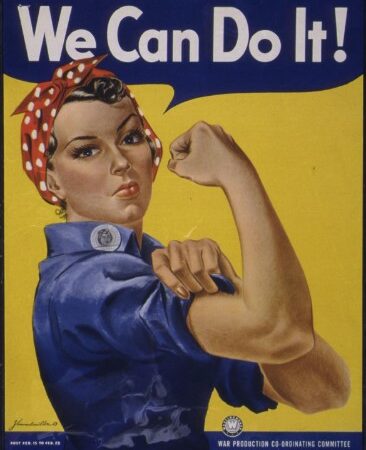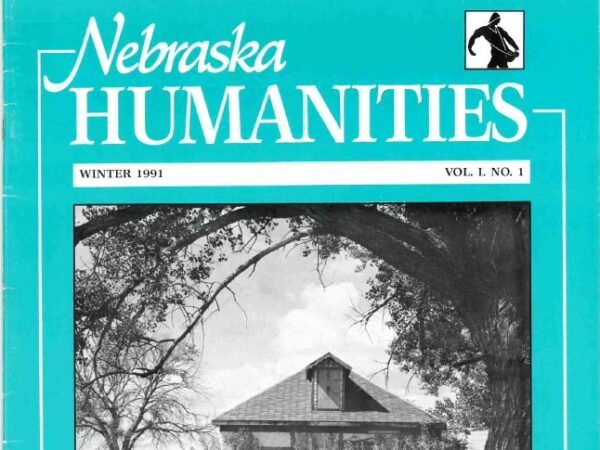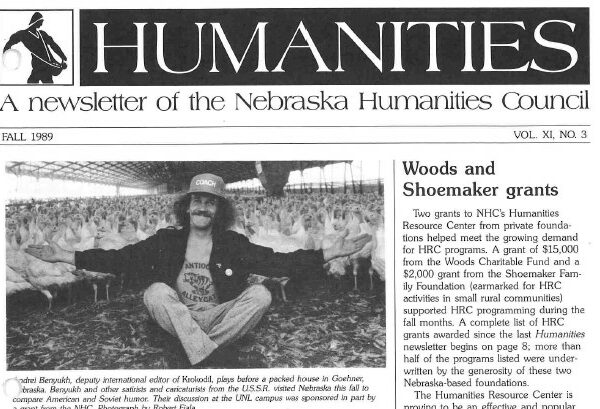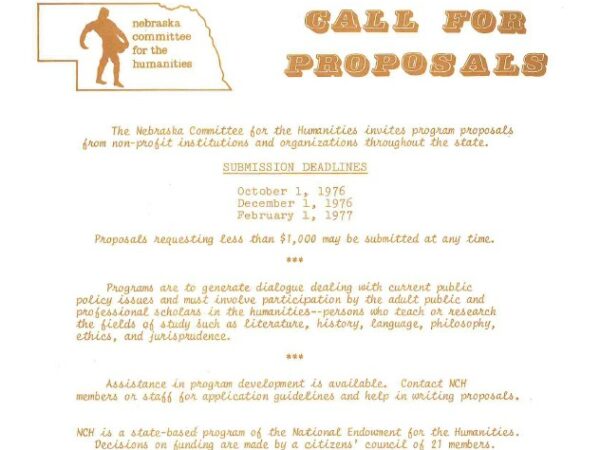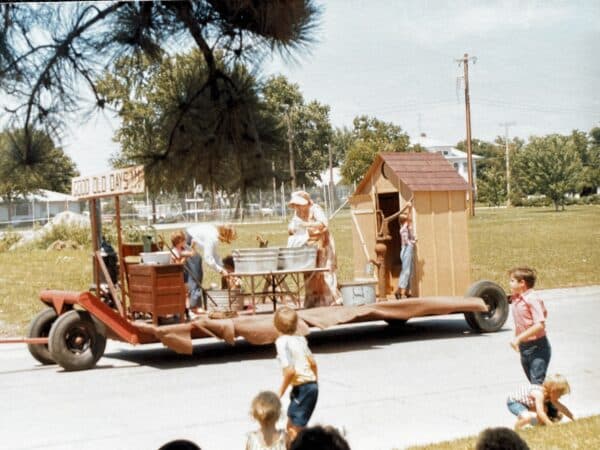50 Years of Humanities Nebraska
- All
- 1970's
- 1980's
- 1990's
- 2000's
- 2010's
- 2020's
-
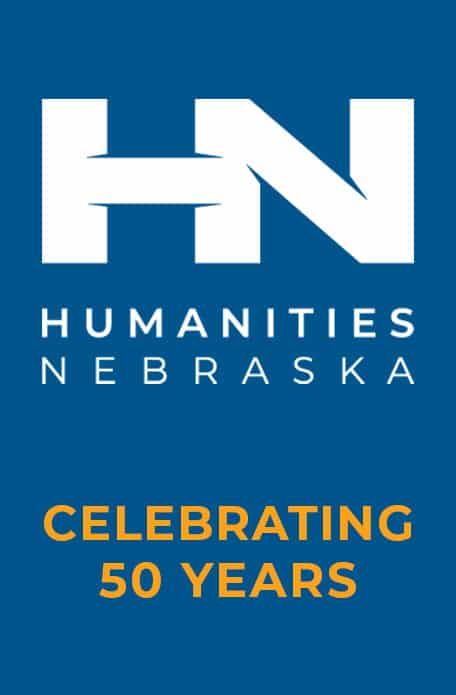
Humanities Nebraska 50th Celebration
May 1, 2023Lorem ipsum dolor sit amet, consectetur adipiscing elit. Integer in augue suscipit, maximus ligula sed, eleifend dui. In faucibus consequat massa, nec tincidunt metus maximus a. Morbi eu nisi pharetra, vehicula arcu et, feugiat justo. Aliquam ex ligula, blandit in ex nec, dignissim fermentum augue. Sed finibus sagittis velit in aliquam. Donec tempor quam purus, quis ultrices turpis finibus nec. Quisque at urna imperdiet, congue augue et, posuere lorem.
Optional Sublabel May 1, 2023 -
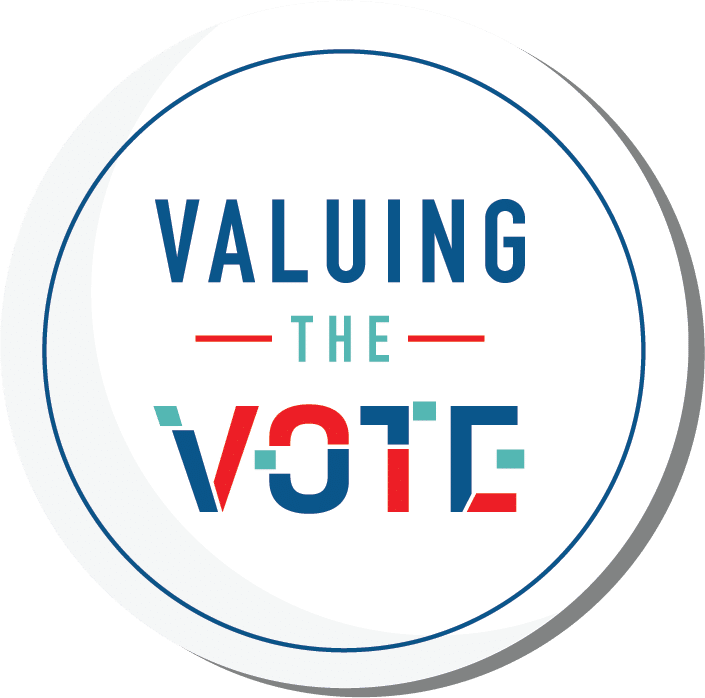
Valuing the Vote Series begins
2020- With generous funding from the Andrew W. Mellon Foundation, Humanities Nebraska (HN)
offered nine programs in the “Why it Matters” series that took place from Nov 2020 through
April 2021. - These programs focused on the hard fought battles
waged historically to give all American citizens the right to vote, consider the meaning of
enfranchisement in the 21st century, and discuss what the future might hold for civic
participation.
Programs 2020 - With generous funding from the Andrew W. Mellon Foundation, Humanities Nebraska (HN)
-

Dear Stranger Introduced
2020- In response to social distancing imposed by the COVID-19 pandemic, Humanities Nebraska sought new
ways to engage our audiences that were accustomed to coming together in person. The brainchild of
Oregon Humanities, a statewide letter-exchange project was adapted by staff to encourage people to
reflect on their experiences and beliefs and make new connections by writing letters to
strangers — write a letter, get a letter, and make a new connection.
Programs 2020 - In response to social distancing imposed by the COVID-19 pandemic, Humanities Nebraska sought new
-
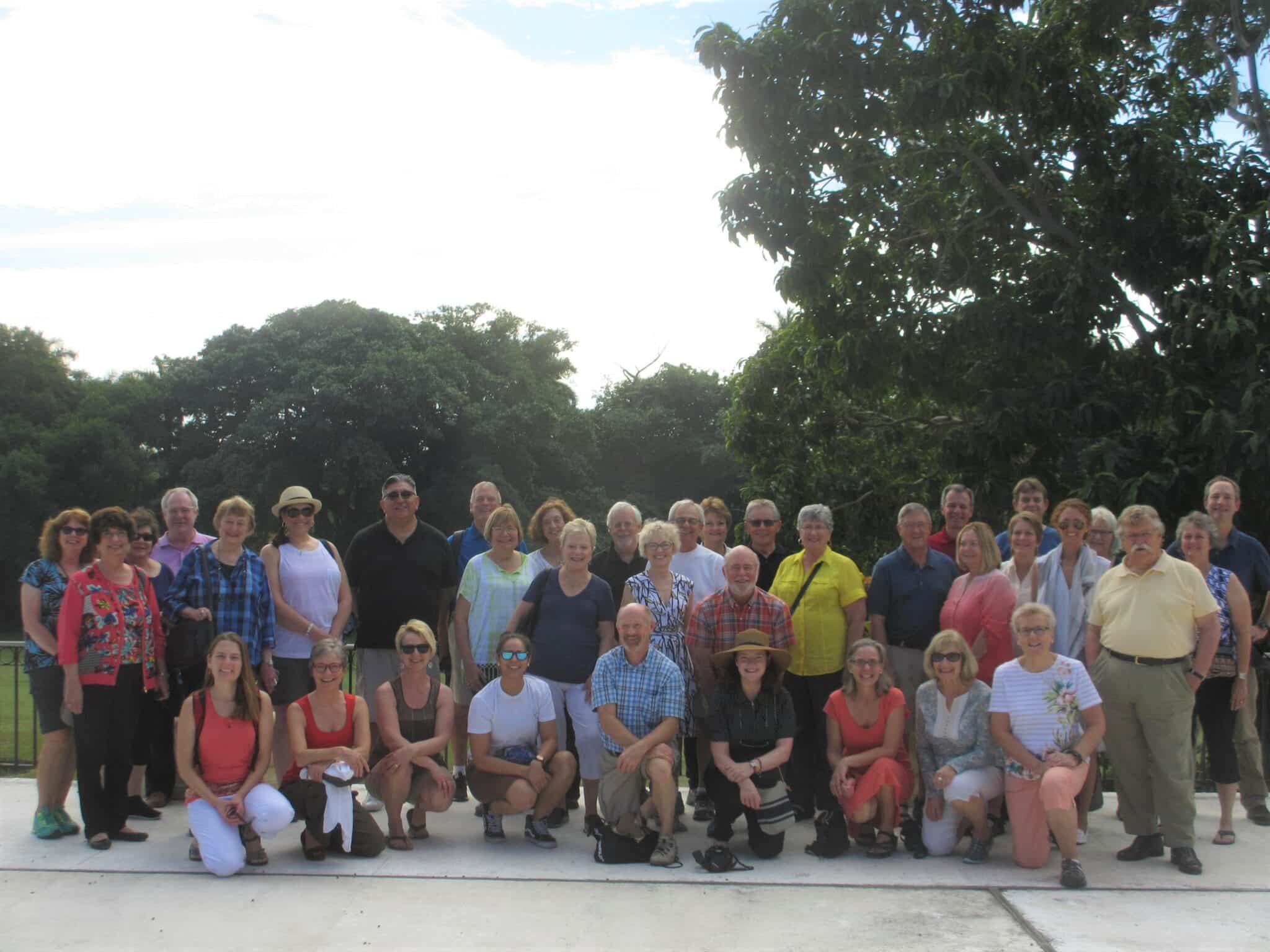
Havana Nights: Humanities, Arts & Jazz in Cuba
2016Led by Cuba expert (and former HN board member) Dr. Jonatha Benjamin-Alvarado, a group of HN board members, past board members and donors visited Havana in Dec. 2016 to explore the humanities, arts and music as part of cultural and educational visit. The group met with the Cuban Institute of Friendship with the People (ICAP) and nonprofit leaders, museum officials, architects and urban planners, toured cultural sites across the city and attended the opening ceremony of the Havana Jazz Festival at the Teatro Mella.
Pictured left:
Humanities Nebraska in Havana, at the University of Arts (ISA)Dec 2016Carol Rempp at the studio of Jose Fuster
At the Hemingway House, outside of Havana
Humanities 2016 -
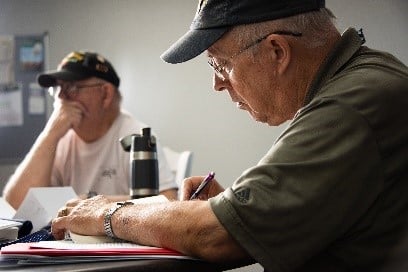
Nebraska Warrior Writers Begins
2014- Nebraska Warrior Writers begins with a pilot program at the Lincoln VA Health Center. The program expanded to Omaha in 2015 and Grand Island in 2017
- Humanities Nebraska partners with the Nebraska Writing Project at UNL to offer writing and discussion workshops for veterans and active military. Participants include combat veterans, retired military, military spouses, and civilians whose lives were touched by war.
Programs 2014 -
-
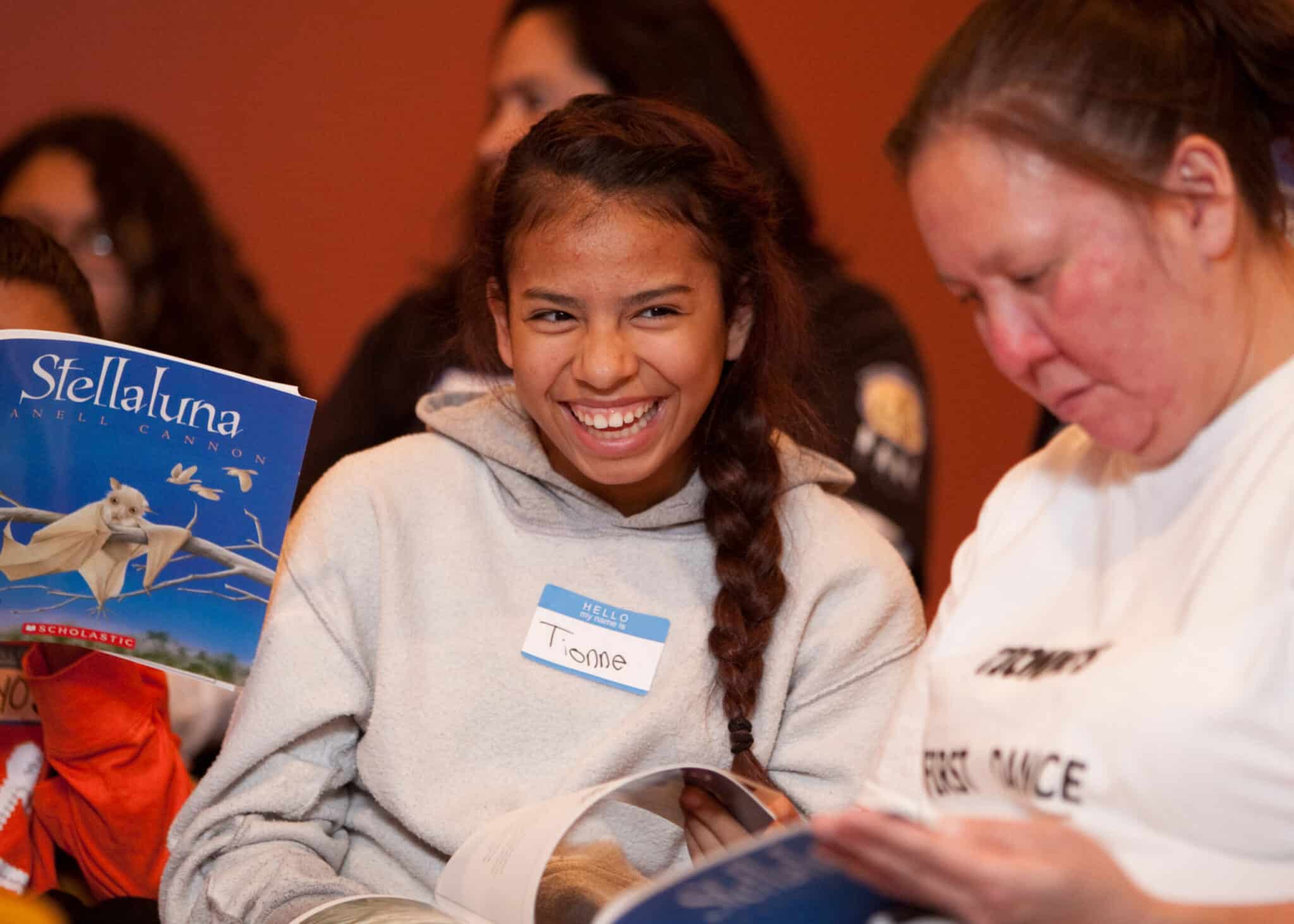
First Native American Prime Time
2011- Nebraska’s first Native American Prime Time was held at the Lakota Lutheran Center in Scottsbluff. Native American Prime Time later expanded to Omaha, Lincoln, and Santee.
Programs 2011 -
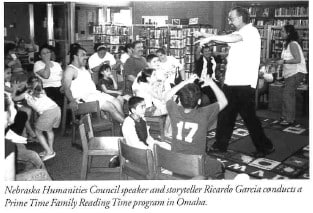
Bilingual Prime Time Begins
2004- In 2004, Prime Time Family reading in Nebraska expanded to include bilingual programs, increasing the diversity of families that participated. This new model was adapted to reach Nebraska’s growing immigrant population, especially those of Hispanic heritage.
- The inaugural bilingual program was hosted in south Omaha in collaboration with Omaha Public Libraries, and was put on my NHC speaker Ricardo Garcia (pictured left).
- Part of the NHC’s five-year strategic plan around this time was to create programs with an emphasis on themes related to immigrants. The goals of these themes were to enhance understanding and appreciated of new immigrant culture, create an understanding and appreciation of immigrant experience, encourage understanding and connection and create support within Nebraska communities for new immigrants.
-
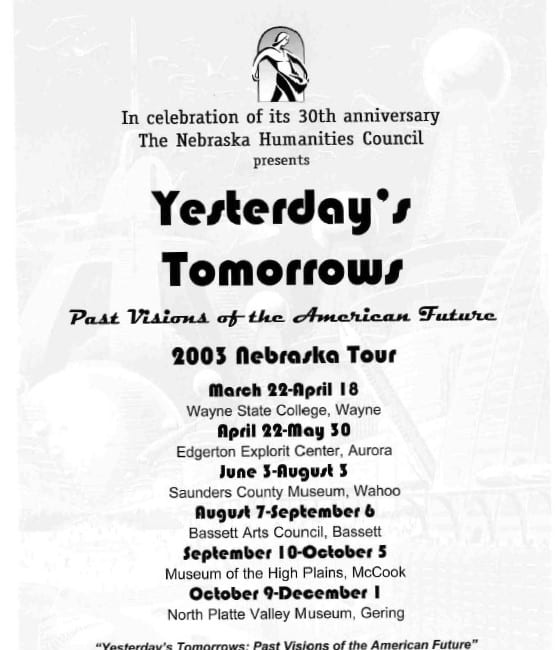
Smithsonian’s “Yesterday’s Tomorrow” Exhibit Begins
2003- In celebration of it’s 30th anniversary, the NHC presented the Smithsonian’s “Yesterday’s Tomorrow” exhibit in 2003.
- The SITES (Smithsonian Institution Travelling Exhibit Service) travelled to Wayne, Aurora, Wahoo, Bassett, McCook, and Gering.
-
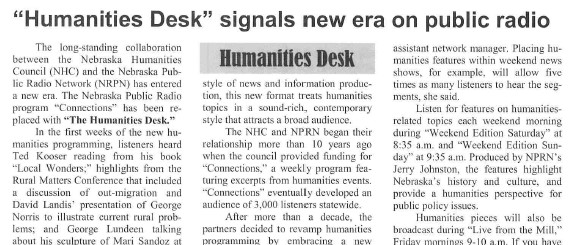
“Humanities Desk” broadcasts begin on Nebraska Public Radio
2003- In 2003, “Connections”, a humanities-based radio program, was replaced with “Humanities Desk”.
- Like “Connections”, the new program was in partnership with NPR, and hosted shows featuring excerpts from humanities events.
-
Governor Johanns proclaims 2003 as 30th anniversary for NHC
2003- In 2003, the NHC celebrated its 30th anniversary.
-
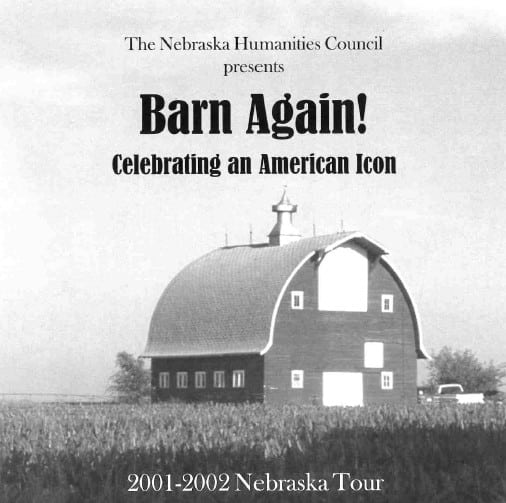
Smithsonian’s “Barn Again” Exhibit Begins
2002- The nine-community tour of the Smithsonian’s exhibit began in Gering, Nebraska and travelled to McCook, Belvedere, Broken Bow, Madison, Tekamah, Springfield, Lincoln, and Grand Island.
- The statewide tour featured living history exhibits, art and photography, local barn histories, and barn-related events.
- From the NHC newsletter at the time, “Barn Again” places the barn in the context of American history and the evolution of American agriculture. It presents information about the origin and development of the barn as a warehouse, factory, and cultural icon.
- The exhibit was developed especially for rural audiences and small museums that do not have access to traveling exhibitions due to space and cost limitations.
Programs 2002 -

Prime Time Family Reading comes to nebraska
2002- In 2002, NHC announced the beginning of Prime Time Family reading in Nebraska.
- The program began as a six-week series, hosted in the Bennett Martin Library, and was intended to encourage families to bond over book, discuss humanities topics, and become frequent public library users.
Prime Time 2002 -
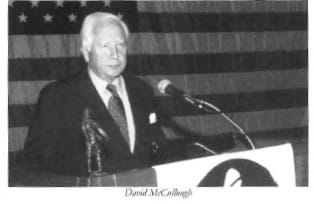
David McCullough Gives Memorable Lecture
2001- On September 20, 2001, David McCullough stepped up to the podium to begin his speech for the 6th annual Governor’s Lecture in the Humanities. His speech was preceded by the famous speech by President George Bush regarding the 9/11 terrorist attacks, which those in the audience viewed before David took the stage.
- Only a week after the attacks, McCullough’s speech is one of the most memorable of any Governor’s Lectures.
- David McCullough was considered a “master of the art” of narrative history; his works made him a two-time recipient of the National Book Award, and the Francis Parkman Prize.
Programs 2001 -
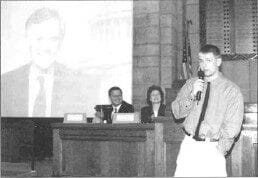
First Nebraska Capitol Forum on America’s Future
1999- On March 26th, 1999, NHC held its first Capitol Forum Day.
- Representatives from 19 high schools participated in debates centering around four potential “futures” for U.S foreign policy, using knowledge gained from curriculum used by their teachers in the classroom to prepare them for the forum. The goal was to explore the United States’ role in the world in the 21st century.
- The day ended with a video conference with Senator Bob Kerrey.
Capitol Forum 1999 -
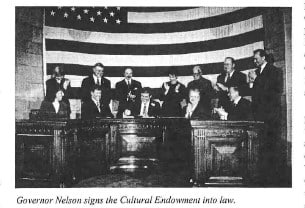
Governor Nelson signs the Cultural Endowment into Law
1998- In April of 1998, the 99th legislature of the Nebraska Unicameral, along with Gov. Ben Nelson, passed LB 799 or the Nebraska Cultural Preservation Endowment Fund.
- LB 799 set aside $5 Million in state funding to be placed in an endowment, from which the earnings could be used to stabilize and support the arts and humanities in the state, so long as those earnings were matched by outside funds.
- The Nebraska Cultural Preservation Endowment was the first legislation of its kind in the nation.
-
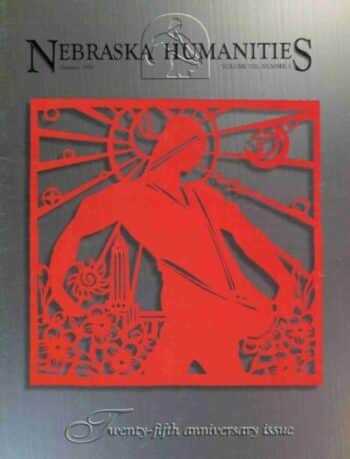
NHC 25th Anniversary Year
1998- On January 21, 1998, Gov. Ben Nelson signed a proclamation declaring 1998 as the 25th anniversary of the Nebraska Humanities Council.
Pictured left is the 25th Anniversary addition of Nebraska Humanities magazine, published in the summer of 1998.
History 1998 -
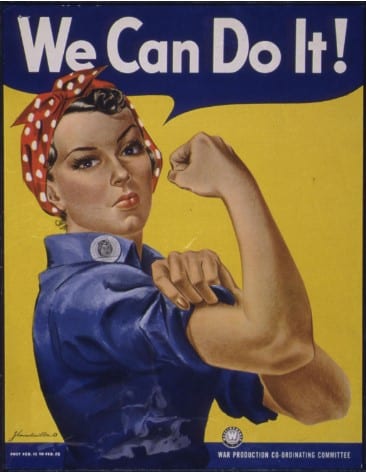
Smithsonian’s “Produce for Victory” exhibit begins
1996- Produce for Victory: Posters on the American Home Front 1941-1945 exhibited at Banner County Historical Society, Geneva Public Library, Fillmore County Library, Cozad Historical Society, Nemaha Valley Museum
-

Gov. Ben Nelson Inaugurates Governor’s Lecture in the Humanities
1996- The first annual Governor’s Lecture in the Humanities took place in 1996, in conjunction with that years’ Sower Award ceremony.
- The Governor’s Lecture featured Ted Sorenson.
Pictured left is an image taken during the Sower Ceremony and Governor’s Lecture
-
Molly Fisher receives Mildred Bennett Award
1995- Molly Fisher, a project director at NHC, was awarded the Mildred Bennett award in 1995.
- The award, presented by Nebraska Center for the Book, is awarded to individuals who make a significant contribution to literary tradition in Nebraska.
History 1995 -
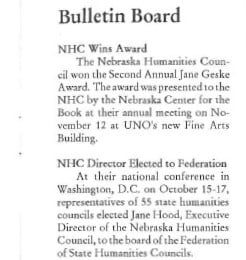
Humanities Council Receives Jane Geske Award
1993- The Jane Geske award, presented by Nebraska Center for the book.
- From the Nebraska Center for the Book, the Jane Geske award is granted to “to an organization, business, library, school, association, or other group that has made an exceptional contribution to literacy, book selling, books, reading, libraries, or Nebraska literature.”
- NHC accepted the second annual Jane Geske award.
History 1993 -
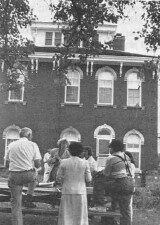
Nebraska Foundation for the Humanities reorganizes
1992- The Nebraska Foundation for the Humanities worked along with attorney Robert Nefsky to restructure the foundation and revise its bylaws in late 1991.
- The restructuring focused on ensuring the foundation itself could be more geographically representative, and allow for more than just past and current council members to join.
- Foundation members collaborate with NHC on special events, broaden the circle of humanities friends and supporters in their community, and help increase private and corporate giving to NHC.
Pictured left is an image of NHC board members at their annual fall meeting at Muir House, enjoying the fall day with informal discussion
History 1992 -
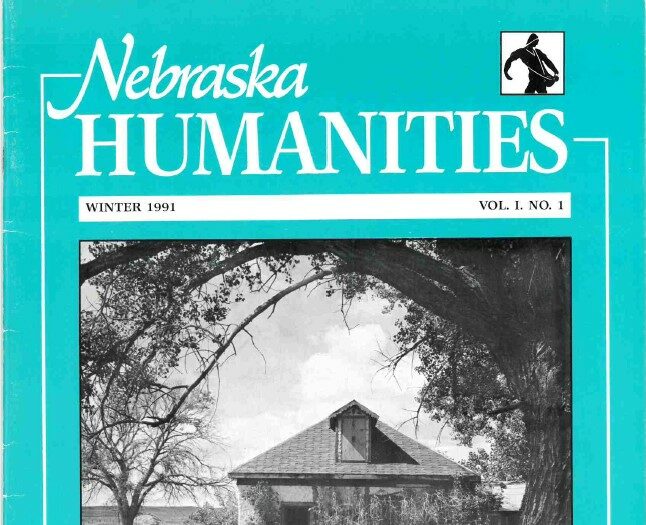
First Nebraska Humanities Magazine Published
1991- Nebraska Humanities magazines were introduced in 1991 and published quarterly.
- The publication of the magazine was intended to create shorter versions of articles commonly found in The Nebraska Humanist, to be delivered to the humanities community more frequently.
History 1991 -
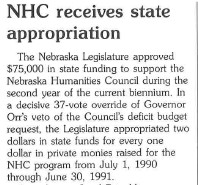
NCH receives first state appropriation
1990- In 1990, the Nebraska State Legislature approved $75,000 in state funding to support the Nebraska Humanities Council.
- The appropriation allows for two dollars in state funds appropriated for every dollar raised in private funding for the NHC program.
- This appropriation was the first of it’s kind for state humanities councils.
History 1990 -
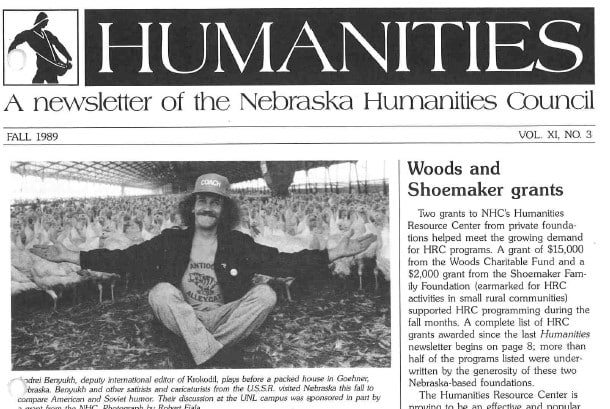
Nebraska Committee for the Humanities Changes name to Nebraska Humanities Council
1989- The change was announced in their Fall 1989 newsletter.
-
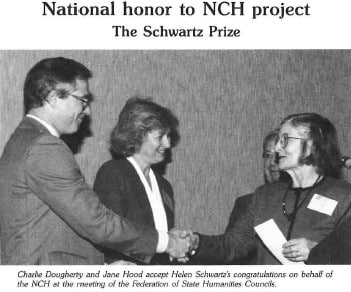
NCH wins Schwartz Prize
1989- The Schwartz prize is awarded to one state humanities council every year for outstanding and innovative programming.
- The award was presented to NCH in December of 1989 at a national meeting of the Federation of State Humanities Councils, for the “Nebraska Project ’87” program.
History 1989 -
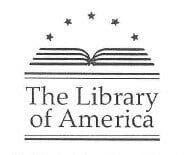
“Library of America” project in 62 libraries
1988- The Library of America program worked in partnership with the NCH, the Nebraska Library Commission, and the Nebraska Library Association.
- This statewide program focused on book acquisition for several libraries across Nebraska.
Programs 1988 -
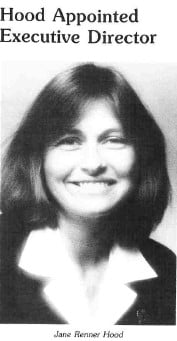
Jane Renner Hood Appointed Executive Director
1987- Jane Renner Hood was appointed Executive Director in 1987
- A native Nebraskan, she got her B.A from Doane College, and her M.A and Ph.D. in history from UNL. She was an Associate Director for the Illinois Humanities Council before joining NCH, and she was an active philanthropist and writer.
- She would go on to serve as Executive director until the end of 2010
History 1987 -
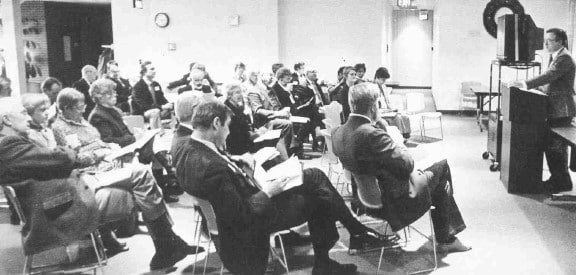
NCH Holds First Public Meeting
1987- NCH staff and Board members joined Nebraska citizens from across the state on the fourth floor of Bennett Martin Public Library to review the goals and plans of the NCH for 1987.
- An announcement to the public contained an open call for individuals to participate in discussion on how well the NCH was serving humanities needs through public programming across the state.
- The meeting was also attended by members of the Nebraska Historical Society, the Nebraska Library Commission, and members of the Nebraska Foundation for the Humanities.
History 1987 -
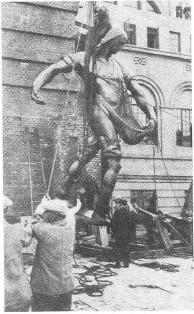
Happening in Lincoln: The Sower being Rasied
1986- The Winter 1986 edition of the NCH newsletter contains this historical picture from the Nebraska State Historical Society of The Sower being raised.
- “The Art and Architecture of Nebraska’s Capitol” was the subject of three NCH grants at the time!
History 1986 -
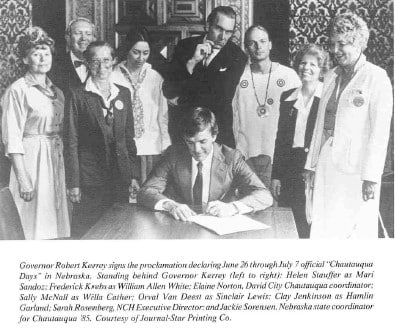
Gov. Robert Kerrey declares official “Chautauqua Days”
1985- In the fall of 1985, Governor Robert Kerrey signed a proclamation declaring June 26th – July 7 official “Chautauqua Days” in Nebraska.
Chautauqua 1985 -
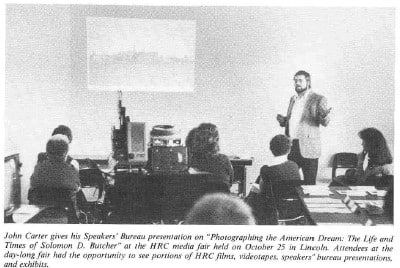
NCH announces program emphasis on “Work, Commerce, and Values”
1985- NCH’s new program theme “Work, Commerce, and Values” was kicked off at the Humanities Resource Center (HRC) media fair.
- The fair included a speaker’s bureau program by John Carter entitled “Photographing the American Dream” and a series of films from HRC’s videotape exhibit “Getting the Picture: The Growth of Television in America.” (Pictured left)
- A few of the films focused on issues related to unemployment, plant closings, and the deindustrialization taking place at the time (see image below). Other focused on the nature of work and pride in craftsmanship. One film in particular, “One Generation is Not Enough” followed and father and son who are fourth and fifth generation violin makers.
- Other HRC film themes present at the media fair were “History, politics, and Women”, discussing women’s history and roles of the past, and “The Ethics of Aging, the Land, and War” discussing ethical issues related to growing old in America, the erosion of valuable topsoil, and the scientific and technological development of nuclear weapons.
-
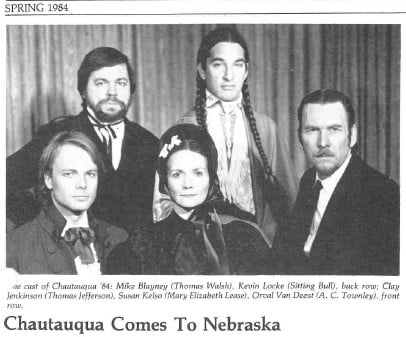
Great Plains Chautauqua Begins
1984- 1984 Chautauqua took place in Beatrice and Scottsbluff-Gering, presenting a total of 15 programs including dramatic characterizations, discussion, debate, workshops and local entertainment.
- The program was funded by a $115,375 NEH Exemplary Grant and also toured in Kansas, North and South Dakota.
- The theme for the year was “Jefferson’s Dream and the Plains’ Reality”.
Chautauqua 1984 -
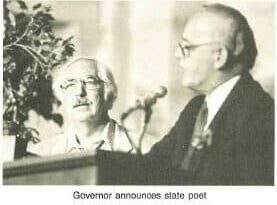
NCH selects Bill Kloefkorn State Poet Laureate
1982- The term “Laureate” came from Greek history, as Apollo was prophesized to crown those of worthy distinction with his laurel wreath, so did the Greeks bestow Laurel upon Olympic athletes, military heroes, and those who gave voice to society’s honor.
- Nebraska was the first to name a State Poet Laureate in 1921, when the title was given to John G. Neihardt. It stayed with him until he passed in 1973.
- In 1982, the Nebraska State Legislature gave NCH the lead in the selection process of a new State Poet Laureate to develop a new tradition, and they selected Bill Kloefkorn

Pictured above is the State Legislatures motion to grant State Poet Laureate selection responsibility to NCH, signed by the President and Clerk of the Legislature
State Poet 1982 -
Nebraska Foundation for the Humanities Organized
1981 -
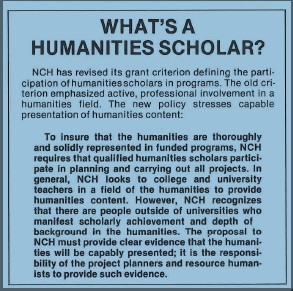
Summer Stipend for Scholars First Awarded
1980- In 1980, NCH revised its grant criterion to define the participation of humanities scholars in programs
- Prior to this change, NCH relied on college and university professors in the field of the humanities for humanities content
- This change allowed scholars, or other individuals outside of universities with deep background and scholarly achievement in the humanities to bring humanities content forward for programs, enriching programs in both content and presentation
- Future stipends would also fund up to two months of research in the humanities for college and university scholars
Humanities Scholars 1980 -
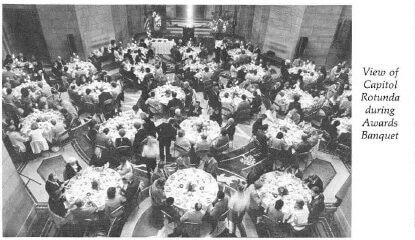
First Sower Award in the Humanities
1980- The Sower award was given to a Nebraskan who made significant contributions to the state’s intellectual life through the humanities
- The ceremony took place in the rotunda at the State Capitol
- The awards were presented by Lt. Governor Roland Luedtke to two University of Nebraska professors; Richard Lane of UNO, English, and Keith Sawyers from UNL, Architecture
Sower 1980 -
Committee Office Moves from Kearney to Lincoln
1980 -
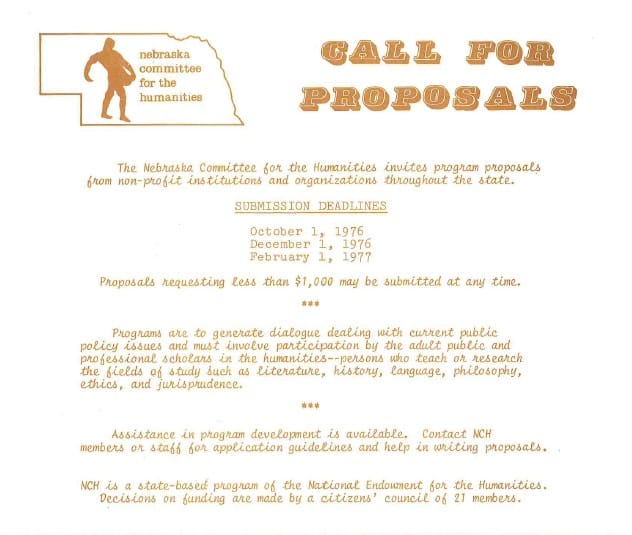
Mini-Grant Program Beings
1976- NCH begins offering grants to programs in need of $1,000 or less in funding
Beginnings 1976 -
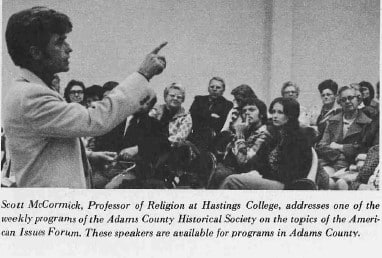
Bicentennial “American Issues Forum” begins
1976- Announced by the National Endowment for the Humanities
- Designed to offer a nation-wide dialogue about the country during the Bicentennial year
- Adapted from an idea by Walter Cronkite, that people should “understand who we are before we look at who we should be.”
- Programs were scheduled throughout the entire year, including topics like “Certain Unalienable Rights” discussing the first amendment, “The Land of Plenty”, discussing struggles on the frontier, and “Life, Liberty, and the Pursuit of Happiness” which dove into success, passion, and where one finds true meaning in the Bicentennial age
Programs 1976 -
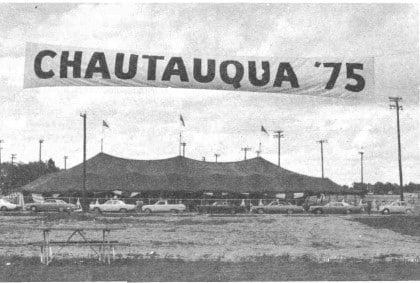
Chautauqua ’75
1975- 1975 Chautauqua took place in Nebraska City, touring five other Nebraska communities as well
- The Nebraska Committee for the Humanities was the primary source of outside funding for the program, providing a $6,000 grant for every community on the tour
Programs 1975 -
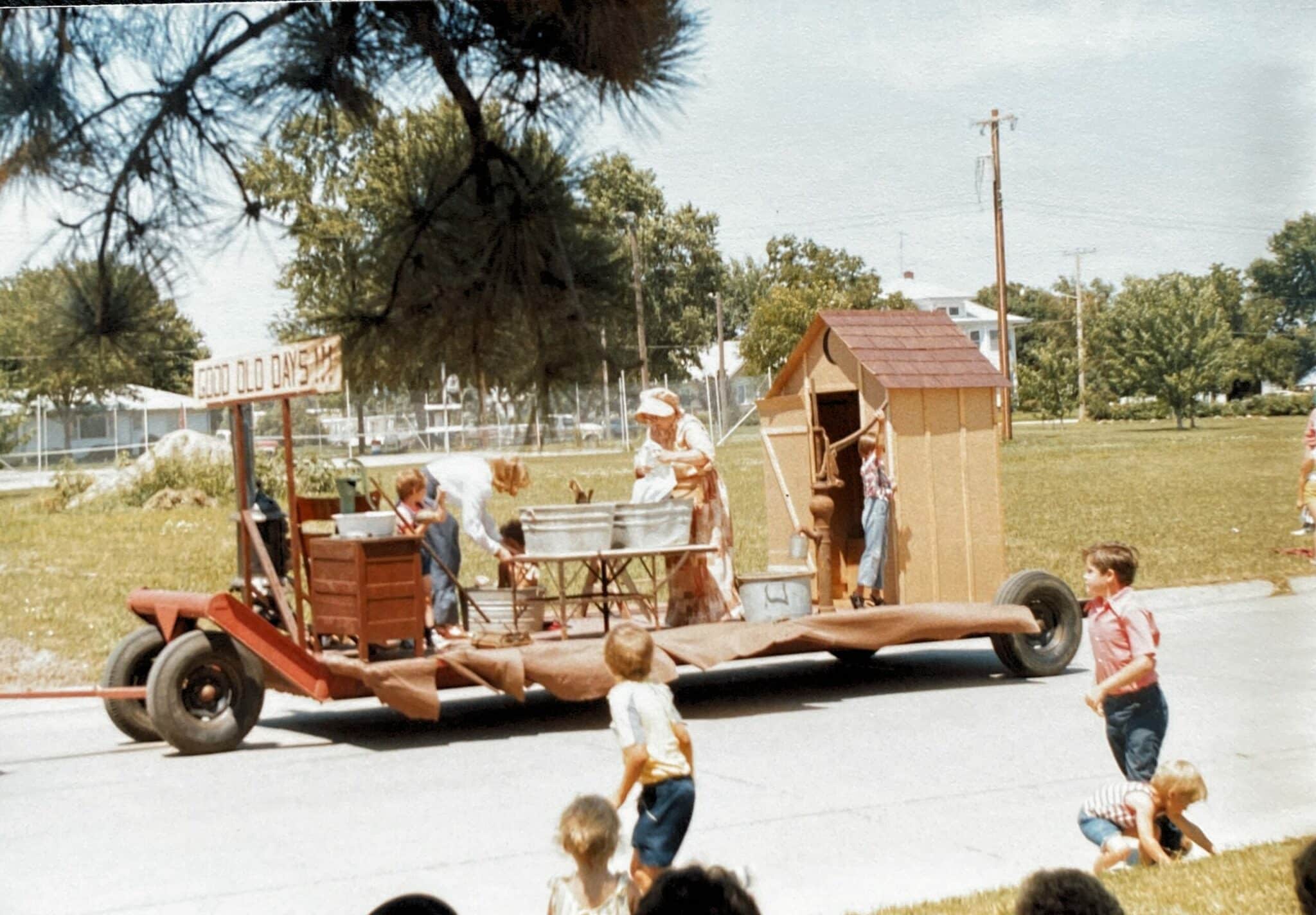
Building a Humanities Presence
1974- First grant awarded in 1974; A total of $84,779 was given to organizations across Nebraska for 22 programs with audiences ranging from 14 to 3,000 people! The photo on the left shows an image from one of the first grant recipients in Exeter!
- First newsletter for the Nebraska Committee for the Humanities is published and distributed
First Steps 1974 -
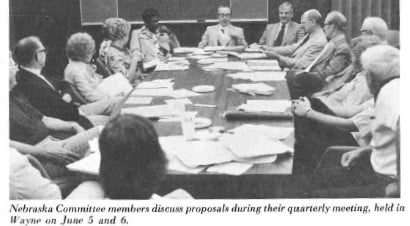
First Nebraska Committee for the Humanities is started
1973- William Brandenburg chairs organizing committee
- Bob Manley is hired as Planning Coordinator
- Office is Established in Kearney
Beginnings 1973

